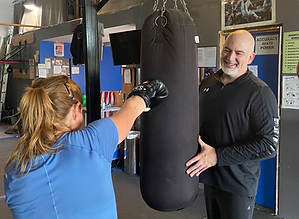
Jason Barnhart, M.D.
-----Board Certified Psychiatrist
Welcome.
I've been helping people enjoy their lives more fully for over twenty years.
If you're looking for a psychiatrist who strives to work relationally and care for people, rather than just treat symptoms, read on to see if my practice would be a good fit for you.
Degrees of Freedom is a physician practice specializing in psychiatry, psychotherapy, and movement.
My Approach
I care for adults and emerging adults (ages 15 and up) through psychotherapy, pharmacotherapy, and other therapeutic modalities. Taking advantage of one of these does not mean you have to engage in the others, though they often do work best together. In the morning hours, I also might add coffee to my approach. If we're working in person, I'll offer you some, too . . . unless coffee makes you anxious.
I will strive to work holistically and relationally with you, whether we are employing medication, engaged in psychotherapy, or safely doing some "bag work" or other movement. I will offer options and support as you chart your own course in caring for yourself. I'll encourage choices that I think will help you feel better, but will always recognize that this is your life and these are your decisions.
If you would like to stay with more traditional ways of working, such as either individual therapy or brief, therapeutic visits with integrated pharmacotherapy, I'm happy to sit across from you, to listen, and to do that.
If you'd like to add somatic work, such as exercise or non-contact boxing, we can do that, too.
I have some patients who prefer to handle most of the interview that would occur in a traditional "med-check" while in between rounds of mitt work or bag work. (I'm a certified boxing coach, and I can ease you into that sort of thing, if it interests you.)
I have other patients who prefer to walk and talk, putting us shoulder to shoulder as we think together about their life.
My approach may involve . . .

. . . coffee . . . unless coffee makes you anxious.

. . . employing medication. . . [but only if you want to]

. . . or safely engaging in some "bag work" or other movement. [again, only if you want to]

. . . I'm happy to sit across from you, to listen, and . . .

. . . to walk and talk, putting us shoulder to shoulder as we think together about [your] life.



Areas of Expertise
Psychotherapy
I have extensive training and experience in psychodynamic psychotherapy, cognitive behavioral therapy, and mindfulness based therapy. During my residency, I sought and received three years of individual, weekly supervision of psychotherapy cases in addition to the psychotherapy training required by the residency. I'm very grateful for the faculty who spent that time with me. I'm also thankful for all the clients with whom I've had the privilege to work since. They have taught me much; the learning never ends.
Psychiatric Medicine
I'm an expert in the use of medications to help with depression, anxiety (including post-traumatic stress), bipolar disorders, ADHD, psychosis, and other difficulties.
I have worked with these medications at every level, from lab bench--at the Division of Molecular Psychiatry at Yale University School of Medicine--to the bedside in my inpatient and outpatient clinical work over many years.
That said, my original plan was to become a clinical psychologist. But during my early research experience in the VA (Veteran's Affairs) system--studying substance dependence and post-traumatic stress--I saw that patients were better served if the doctor treating them medically also listened to them and tried to understand their story.
I changed my plans and became a physician.
Embodied therapies
Guided exercise, such as non-contact boxing, supports mental health and overall wellness. I am a certified coach through USABoxing, hold a black belt in karate, and have several years of experience in both aikido and jiu-jitsu.
These therapies may be adapted for those of most any ability, age, or health condition. They may also be especially useful for folks who are uncomfortable in a traditional "talk therapy" setting.
Frequently Asked Questions
A psychiatrist is a physician (an MD or a DO) who has completed medical school and then completes residency training in order to specialize in dealing with mental, emotional, and behavioral difficulties.
Our training includes a four year undergraduate degree, four years of medical school, and four years of residency training--during which we work as physicians in both hospitals and clinics, while still reporting to more senior physicians.
Nope. I'll tell you which medications or therapies I think may be of benefit to you, but I have no attachment to whether or not you take a medication. Many patients who work with me do benefit from medication, some used medication for a limited period and no longer do, and some have never used a medication.
That's kind of like arguing that great massage therapists should be able to give themselves great massages.
Needing a hand doesn't mean you're "less than." It just means that you can't be in two places at once. None of us can.
What is a psychiatrist?
If I see you, will you pressure me to take a medication?
Shouldn't I be able to do this on my own?
Pharmacotherapy is a better description of what should be happening if you're using a medication. Taking a medication involves much more than simply swallowing a pill. It involves what you think and feel about taking a pill, how you observe yourself over time, and how you use those observations to make ongoing decisions about medication use and other aspects of your care.
I'll also mention here that if you can already experience taking a medication as a choice and a way to compassionately care for yourself, I'm thankful. But not everyone starts there. For many, the mere prospect of taking a medication is daunting, and may bring up past experiences like suffering side effects, being treated dismissively, or being judged.
Psychiatry is about changing the state you are in, and that requires an awareness of the variables that result in that state--both the things you can change and the things you can't. Each of the things you can change is a degree of freedom.*
Why do you use the term "pharmacotherapy," rather than "medication management?"
Why did you name your practice "degrees of freedom?"
* full disclosure: I do think about degrees of freedom as they pertain to statistics, engineering, and chemistry, but usually if I talk about those things people's eyes glaze over--so I resist the urge.
Services
Holistic psychiatric evaluation
an evaluation geared toward understanding you as a person by learning about and considering the biological, psychological, and social aspects of your life (about 90 minutes)
Integrated psychotherapy and pharmacotherapy
a 50 minute session
Therapeutic appointment with emphasis on pharmacotherapy
a 25 minute session
Embodied therapies
a session involving movement, such as non-contact boxing or walking, which may include pharmacotherapy (time varies according to agreed upon treatment plan)
Genetic testing
a sample (just a cheek swab--no needles) allows for analysis of clinically relevant genetic variations in one's DNA. Not usually necessary, but helpful in particular cases.
Billing
All fees are billed at the time of service to an on-file credit card. We do not contract with any insurance companies, so we are always considered "out-of-network."
In most cases, we are happy to provide you with a superbill, which is a detailed invoice including treatment and diagnostic codes which you may submit to your insurance company for reimbursement. Out of network benefits for services vary widely, so be sure to check with your insurance company ahead of time if you plan to seek reimbursement.
Medicare patients may choose to privately contract with us for physician services. This involves signing a contract which attests to a shared understanding that neither our practice nor the patient will seek reimbursement (from Medicare or from any secondary insurance) for care received. In these cases, no superbills will be issued.
We're unable to provide care to Medicaid patients, as Medicaid guidelines prohibit us from accepting private payment (even at greatly reduced fees) from patients covered by Medicaid.

Contact Us
If you would like to book an appointment, please review the service and billing information above, then call or email us. Either my assistant, Carmel, or I will return your call to guide you through initial steps and schedule your first appointment with me.
After your first appointment, you and I will plan your follow up appointments together, based on your needs.
Initial evaluations and follow up appointments are also available online, when clinically appropriate.
Thanks! I look forward to meeting you.
Dr. Barnhart
Phone: (720) 310-8750
or, email my assistant at: Carmel@myboulderpsychiatrist.com
5305 Spine Road
Suite E
Boulder, CO 80301
Established patients may log in through our HIPAA compliant client portal by clicking the logo below for their scheduled virtual sessions.

